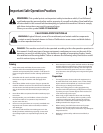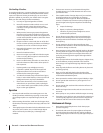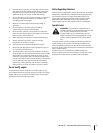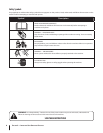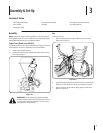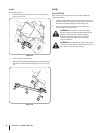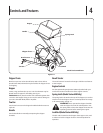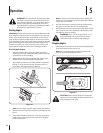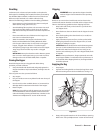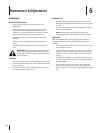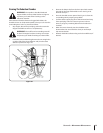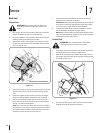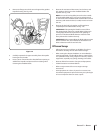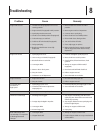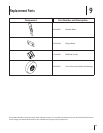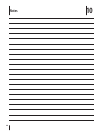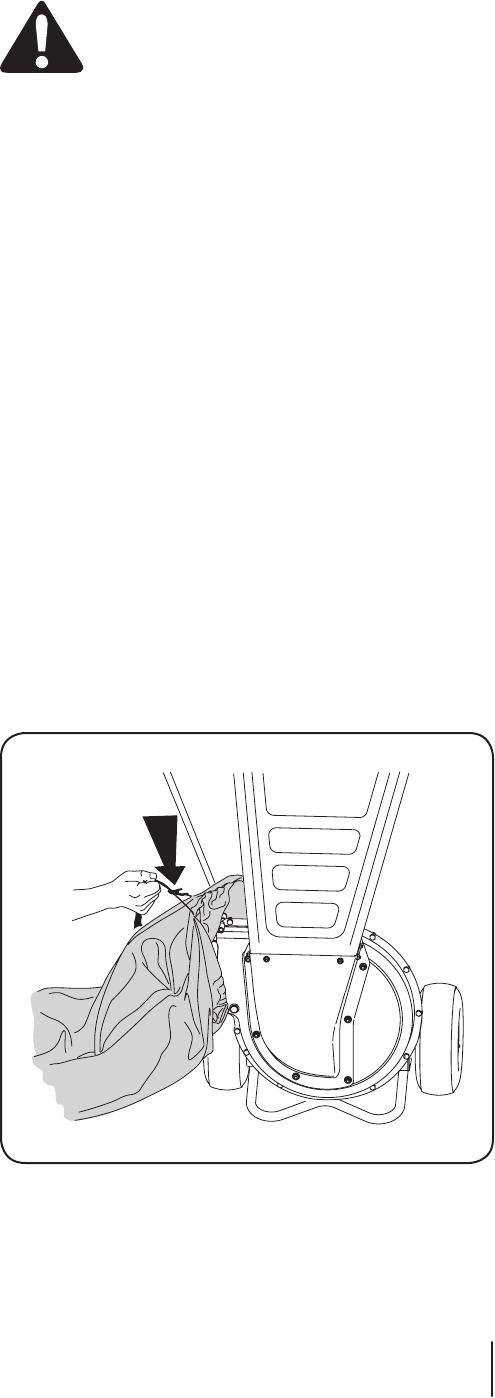
11Section 5 — operation
Chipping
WARNING: Never operate the chipper shredder
without chipper chute lowered into the operating
position.
Branches up to two inches (model series 410) or three inches
(model series 420) in diameter can be fed into the chipper chute.
Observe the following guidelines when chipping branches:
• Keep both hands firmly on the branch as you feed it into
the chipper chute.
• Never feed more than one branch into the chipper chute at
a time.
• Never feed anything other than branches (or wood) into
the chipper chute.
• Apply intermittent pressure (force, in short pulses) while
feeding larger branches into the chipper chute, to avoid
bogging or stalling the engine.
IMPORTANT: Never feed branches with a diameter greater
than two (2) inches (Model Series 410) or three (3) inches
(model series 420) into the chipper chute. Doing so can
result in serious damage to your unit’s chipper blades, flails
or impeller.
NOTE: For best performance, always operate the unit with
sharp chipper blades. If a noticeable loss in performance is
encountered while chipping branches, the chipper blades
should be replaced.
Emptying the Bag
1. Stop engine.
2. Squeeze the locking buckle to release the bag’s draw-strap
before loosening it from the chute deflector. See Fig. 5-3.
3. Empty the bag and reattach to the chute deflector opening.
Refer to the “Set-Up & Adjustments” section of this manual.
Shredding
Yard waste such as leaves and pine needles can be placed in
the hopper for shredding. After material has been processed by
the shredder blade and flails, it will be forced out of the chute
deflector, and, if attached, into a debris collection bag.
Observe the following guidelines when shredding yard debris:
• Never attempt to shred material other than normal yard
debris (leaves, twigs, pine cones, etc.).
• Avoid shredding fibrous plants such as tomato vines until
they are thoroughly dried out. Fresh vines do not shred
well and tend to wrap themselves around the impeller and
flails.
• Place reasonable amounts of debris into the hopper at a
time. Do not overload the hopper.
• Allow the material in the hopper to be drawn into the
blades and shredded before adding additional debris
to the hopper. Failure to due so may result in a clogged
hopper, clogged chute deflector or a stalled engine.
• Avoid placing twigs longer than 24 inches into the hopper.
Twigs longer than 24 inches may result in a clogged
hopper.
IMPORTANT: Never place branches with a diameter greater
than 1/2-inch in the hopper. Doing so can result in serious
damage to the unit’s shredder blade, flails or impeller.
Clearing the Hopper
Should the hopper become clogged with debris during
operation, proceed as follows:
1. Grasp the handle with both hands and gently agitate the
chipper shredder to help loosen debris, drawing it into the
impeller.
If the clog does not clear, proceed as follows:
1. Stop engine.
2. Use your hands to remove any debris found near the top of
the hopper.
3. Use a branch (or other available device, i.e. broomstick) to
dislodge debris located toward the base of the hopper.
4. Restart engine.
NOTE: If you’re unable to pull the starter rope as a result of
accumulated debris near the impeller, follow instructions
under the heading Cleaning the Reduction Chamber in the
“Maintenance & Adjustments” section of this manual.
Figure 5-3



